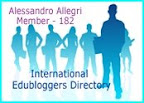"Notionism" is an "ism" that threatens the Italian school system, so compartmentalized in subjects and individuals, ever since.
The usual answer to this risk is that the task of the school system is not just give them some "ready-to-use" knowledge, notions to use or spend immediately or in the working life future, but instead some parameters, some reading keys, methods to interpret the world they live in.
A more balanced version is my principal's: to provide students with a wide enough collection of notions and abilities that each student can build, among many items, his or her own networked knowledge. Here the weight of notions is rated a bit more important than in the previous version, but personal elaboration and interpretation parameters still keep a central role, the power to glue together and to introject notions.
Without being too pragmatic, as sometimes the US/UK approaches tend to be, I too believe that the notions the school system must provide cannot be detached from the world the students live in. It's not a matter of giving them something "useful", but of giving them something they can relate to, because, IMHO, only in this way can notions become part of a personal patrimony. Let's take an example: Latin. Its usefulness (something students always ask about) is quite relative: three hours a week times five years' worth of Latin could be time better spent learning something more "useful" (but what for?). We should probably distinguish different levels of usefulness.
Let's change point of view: I don't think that Latin language is worth teaching and learning because of its "usefulness", but rather because it is "contextualizable", students can relate to it, in the Italian language, in the English language, in other languages' linguistic structures, in logic rules, not to speak of Latin literature itself and of many other countries through the centuries, in the arts, in the sciences... In today's world, knowing the Latin language can allow you to decode great quantities of valuable information of nearly universal purport.
And this holds true for many of the subjects we find in our schools.
There is a catch, though. And the catch is that many subjects don't come contextualized out of the box. Latin can remain a fruitless game of mnemonic rules, an empty translation exercise without content, a dead language with no interest. Why? Because it can lack the context where the subject gets a meaning. The context doesn't need to be one: each student can build his, but what is important is that there is one, because it is inside of it that the motivation to learn develops.
For this reason, a teacher must know the world the students live in, he or she must live, at least in part, in it, he/she must appreciate its potentials and risks. In other words, he must enter it, maybe even be at home in it.
This is why, IMO, today's teachers can no longer ignore the world of the net. Because more and more students, more and more of their students, consider it a part of their horizon. While the net remained just a source of information, it could have still been placed in the second row; but now it's becoming a place of interaction, of exchange, of elaboration of ideas and contents, it can become for many teen-agers a place of primary importance in building their identities and knowledge.
I have no idea about how this so-called Web 2.0 revolution will progress. I am sure that, at least, it has the potential to go far. The fact that here in Italy it hasn't fully blasted does not mean it won't do so soon, but it gives us teachers some time to get updated and make up for our shortcomings. It's possible it is just a bubble that's going to pop in a short space of time. But it's also possible that it's a tiger we either learn to ride or meet grounded. What is the best course of action?
Blogged with the Flock Browser
 Italian version
Italian version





No comments:
Post a Comment